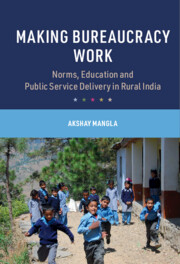Book contents
- Making Bureaucracy Work
- Cambridge Studies in the Comparative Politics of Education
- Making Bureaucracy Work
- Copyright page
- Dedication
- Contents
- Figures
- Tables
- Acknowledgments
- Abbreviations
- Part I Introduction, Puzzles and Theory
- 1 Introduction
- 2 Bureaucratic Norms
- 3 The State and Primary Education in India
- Part II Implementing Primary Education in Northern India
- Part III Comparative Extensions and Implications
- Appendix: Researching Bureaucracy and Frontline Public Services
- References
- Index
2 - Bureaucratic Norms
A Theory of Implementation
from Part I - Introduction, Puzzles and Theory
Published online by Cambridge University Press: 18 November 2022
- Making Bureaucracy Work
- Cambridge Studies in the Comparative Politics of Education
- Making Bureaucracy Work
- Copyright page
- Dedication
- Contents
- Figures
- Tables
- Acknowledgments
- Abbreviations
- Part I Introduction, Puzzles and Theory
- 1 Introduction
- 2 Bureaucratic Norms
- 3 The State and Primary Education in India
- Part II Implementing Primary Education in Northern India
- Part III Comparative Extensions and Implications
- Appendix: Researching Bureaucracy and Frontline Public Services
- References
- Index
Summary
Chapter 2 presents the book’s theory connecting differences in bureaucratic norms to variation in the implementation of primary schooling. I first define implementation and operationalize it for the primary education domain. I then present comparative education indicators, showcasing differences in performance across four Indian states. Next, I develop a theory anchored around the ideal types of legalistic and deliberative bureaucracy. I argue that deliberative bureaucracies, which promote flexibility and problem-solving, are more effective since they can adapt policies to local needs and activate participation from marginalized communities. By contrast, legalistic states, which adhere strictly to rules and procedures, implement policies unevenly and tend to benefit privileged groups in society, weakening the engagement of poor communities. I elucidate two mechanisms: collective understanding and behavior of state officials, and societal feedback, which together yield varied mentation patterns and outcomes. I explore the political origins behind the differences in bureaucratic norms. I scope conditions of my theory and contrast it with alternative political explanations for the implementation of public services.
Keywords
- Type
- Chapter
- Information
- Making Bureaucracy WorkNorms, Education and Public Service Delivery in Rural India, pp. 34 - 85Publisher: Cambridge University PressPrint publication year: 2022

